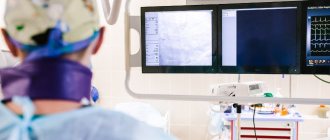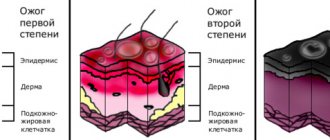Anatomy of the stomach, structure of the stomach, treatment of the stomach
The stomach is a hollow organ that is adapted for filling with food, initial digestion of food, partial absorption of nutrients with further evacuation of the contents into the duodenum. The stomach is located in the upper part of the abdominal cavity, under the diaphragm, mostly to the left of the midline.
The shape and volume of the stomach depend on the tone of its muscles, on its filling with food, on the condition of neighboring organs, and on the position of the body. In the upper part of the stomach the esophagus flows into it, in the lower part the duodenum departs from the stomach.
The stomach has four parts:
- The cardial part of the stomach is located above and adjacent to the opening from the esophagus to the stomach, which is called the “cardia”
- The fundus or fornix is the part of the stomach that is located at the top and forms a kind of dome.
- The body of the stomach is the main middle part of the stomach
- The pyloric or pyloric part is located at the entrance to the duodenum, where the sphincter is located, which regulates the flow of food into the duodenum - pylorus
The stomach wall consists of four layers:
- mucous membrane
- submucosal layer
- muscle layer
- outer serous membrane
Stomach mucosa
The gastric mucosa is a layer on top of which there are cylindrical epithelial cells, under which there is loose connective tissue and then a thin layer of smooth muscle. The loose connective tissue of the mucous membrane contains the glands of the stomach.
There are three types of cells that form these glands. Some of them are called the main ones. These glands produce pepsinogens and chymosin. The next type of cells is called parietal or parietal cells. They produce the synthesis of hydrochloric acid and gastromucoprotein. The third type of cells are accessory cells or mucocytes. They produce mucoid secretion. In the area of the pylorus (pylorus) there are hormonally active cells. These cells synthesize gastrin.
The gastric mucosa also contains a huge amount of other producing biologically active substances. The role of some of them still remains not fully understood. A very important function of the glandular cells of the stomach is the formation of a protective mucous barrier. Continuous synthesis of gastric mucus is required, which is produced by mucus-forming cells.
This function is stimulated by the activating effect of the autonomic nervous system, insulin, serotonin, and prostaglandins. The secretion of mucus increases under the mechanical influence of parts of the food bolus that irritate the gastric mucosa. Some medications reduce the mucus-forming function: aspirin (acetylsalicylic acid), non-steroidal anti-inflammatory drugs, etc.
There are contraindications. Read the instructions or consult a specialist.
Cost of ultrasound of the stomach at the EMC clinic.
Myths and truth about your stomach
Pirogova Irina Yurievna
Deputy Chief Physician for Organizational and Methodological Work, Head of the Center for Gastroenterology and Hepatology, Gastroenterologist
When it comes to the human stomach and digestive system, there are many myths and assumptions. Do you know the truth?
Our stomach can cause a lot of discomfort if it is not working properly. Discomfort is often associated with heartburn, belching or bloating.
Experts say that most people know very little about their stomach and how the digestive tract works, which is one of the reasons why it can sometimes be quite difficult to solve health problems that arise.
Fact or Fiction: The digestive process occurs exclusively in the stomach
It is a myth.
The main process of digestion actually occurs in the small intestine.
The food enters the stomach, is mixed and crushed into tiny pieces, becoming food mush
. This pulp enters the small intestine in small batches, where it is digested.
Refuting popular opinion, experts say that food does not begin to be digested immediately after it enters our stomach. In fact, the stomach only prepares food for digestion.
Fact or Fiction: If you reduce the amount of food you eat, your stomach will shrink and you will be less hungry
It is a myth.
When a person becomes an adult, the size of his stomach no longer changes, unless, of course, he undergoes surgery to reduce it.
Eating less may not allow your stomach to shrink, but it may help reset your “appetite regulator.” Therefore, you will not feel very hungry even if you start eating less.
Fact or Fiction: Thin people have smaller stomachs than obese people
It is a myth.
Although it may be hard to believe, the size of the stomach does not correspond to a person's overall weight.
People who are naturally thin may have exactly the same stomach size as those who have struggled with excess weight their whole lives. Even if you have stomach surgery and reduce it to the size of a walnut, this does not mean that you are not you will gain weight.
Fact or Fiction: Squats or ab crunches can reduce the size of your stomach
It is a myth.
No amount of exercise can help make your stomach smaller, but it can help you get rid of layers of belly fat. Plus, exercise helps strengthen the muscles in your abdomen, which is good for your internal organs.
Interestingly, belly fat can cause a lot of problems, including fat that we don't actually see. This fat accumulates in the form of internal layers and surrounds the internal organs. Overweight people have a lot of fat between the internal organs. In this case, sometimes the liver becomes so “packed in fat” that it leads to a certain form of hepatitis; in special cases, it fails altogether, experts say. The good news is that eating right not only helps control the appearance of visible fat, but also prevents the inner layers of fatty tissue from appearing.
Fact or Fiction: Foods high in water-soluble fiber cause bloating and gas in the intestines, while foods high in insoluble fiber usually do not cause these problems.
This is true.
Fiber is dietary fiber found in most plants. It is the basis of cell walls in plant organisms. Fiber plays an important role in the functioning of the body, promoting good digestion. Many people don't know that there are different types of fiber. Water-soluble fiber is found in foods such as oatmeal, legumes, peas and citrus fruits - these foods are more likely to cause bloating and gas than foods with insoluble fiber - whole wheat bread, wheat, cabbage, beets and carrots.
Gas and bloating occur because the intestinal flora needs to digest soluble fiber. Since insoluble fiber is not digested at all, but simply passes through the gastrointestinal tract, it does not interact with the flora, so gases do not form.
Fact or Fiction: To get rid of reflux disease (sour belching), just lose a little weight
This is true.
The less acid enters the esophagus, the fewer problems. You may not believe it, but it’s enough to remove an extra kilogram from the stomach, and the result will be immediately felt.
During pregnancy, the baby grows and puts pressure on the internal organs, this can cause heartburn, but after childbirth, when the pressure goes away, the heartburn goes away.
The good news, experts say, is that if you lose weight first, you'll be free of heartburn within a few weeks.
Fact or Fiction: If you eat at night, you will gain weight faster than if you eat the same thing during the day
It is a myth.
Most experts believe that we gain weight because we consume more calories than we expend. And although it seems quite logical that the food we eat during an active day burns faster and is more effective than the food we eat before bed, weight gain is not at all dependent on the time of day. Whether you gain excess weight or not depends on how efficiently you spend your calories.
Recent animal studies have shown that avoiding eating in the evening may not help you lose weight. Eating at night can disrupt our body's circadian rhythms, altering the hormones that control appetite, causing us to gain weight.
Also, if you are tired or stressed, digestion is difficult before bed and you may experience bloating, gas, or heartburn. Our digestive canal has its own “brain” that helps food move through the digestive system correctly and in the right quantity. If we are tired, and this happens to almost everyone after a whole day of work, the “brain” of our intestines also gets tired, so it reduces the number of contractions, this, in turn, does not allow food to be properly digested.
Fact or fiction: Cookies with 200 kcal butter will control your appetite more than 200 kcal cookies without butter
This is true
. The reason is that fats are digested much more slowly than carbohydrates and stay in the stomach longer, which means we'll feel full longer if we eat a buttery cookie.
Moreover, simple carbohydrates (cookies, bread or pastries) are known to quickly increase blood sugar and insulin levels, which quickly decrease, leading to mood and appetite swings. You'll get hungry quickly.
Fact or Fiction: Legumes cause gas in everyone, and there's nothing you can do about it
It's a myth...sort of.
Legumes contain a lot of sugar, which requires a certain enzyme to be digested. Some people have a lot of this enzyme, others have a little. The less enzyme you have, the more gases will form in the intestines after eating legumes.
We have given only some of the questions that are often encountered by gastroenterologist patients.
We will be happy to answer your other questions in personal communication - Pirogova Irina Yurievna
Accurate diagnosis
Identification of provoking factors that cause stomach pain always begins with a questioning of the patient and a physical examination - palpation of the abdomen, listening to the heart rhythm and lungs. After this, laboratory tests are carried out:
- Blood test (general and biochemical).
- Study of biomaterial (stool, urine and gastric juice).
To clarify the diagnosis, instrumental tests are also necessary - endoscopy, ultrasound, X-ray, computed tomography or magnetic resonance imaging of the abdominal organs with a contrast agent. In extremely rare cases, it may be necessary to conduct an examination using a laparoscope. When a flexible probe with a microcamera is inserted into the organ through a small incision for a detailed study and assessment of the general condition.
The location of the stomach explains the diversity of the nature of pain and such an extensive list of pathologies that cause them. Therefore, such a symptom should never be neglected. If you experience discomfort in the epigastrium, you must always seek medical help. Timely treatment in many cases guarantees recovery.
Proper nutrition
Diet and a balanced diet are a factor of paramount importance for the normal functioning of the stomach. Compliance with a certain schedule for eating allows you to stabilize the secretion of gastric juice and normalize its motility. The diet must include whole grain porridge, fresh vegetables, fruits and hot first courses. It is useful to exclude sweets and baked goods from the menu, as well as instant and smoked foods.
You should avoid snacking on the go and set aside free time for eating.
Strict dietary restrictions or mono-diets (unless prescribed by a doctor) can also harm the stomach and cause persistent digestive disorders.
How does my stomach hurt?
The pain can be dull, sharp, paroxysmal, occur in the middle, above or below, on the right or left side of the body.
The intensity of such sensations does not always reflect the severity of the condition causing them, just as vice versa - mild but constant pain can be a sign of a chronic disease that needs urgent treatment.
If discomfort in the epigastrium persists for more than two weeks, you need to inform a gastroenterologist about this. This will avoid a more serious diagnosis. The reason to immediately consult a doctor is pain in the peritoneum, accompanied by constant bloating, regular vomiting, diarrhea and blood in the stool.
Diagnostic methods
It is possible to understand the cause of stomach pain and determine the correct treatment tactics based on instrumental and laboratory studies. At the initial examination, the localization and nature of pain is determined by palpation, as well as the degree of its irradiation.
Next, a set of studies may be prescribed:
- Ultrasound - determines the condition of the organ wall;
- MRI, CT are more informative methods that are necessary if tumors are suspected;
- clinical and biochemical blood tests;
- urine and stool tests;
- probing of the stomach and duodenum with further examination of the contents (acidity is determined, microscopy and bacterial culture are performed).
Diagnosis begins with simpler methods that allow you to identify the most common stomach diseases. If necessary, additional studies are prescribed. The Clinical Institute of the Brain has all the conditions for conducting a comprehensive diagnosis of stomach pain.
Active lifestyle
Healthy activity involves regular stay in the fresh air, playing active sports (if you don’t have time or have poor physical fitness, at least walking or cycling). Physical activity normalizes blood circulation and improves the flow of nutrients and oxygen to all organs and tissues, which, among other things, has a positive effect on the functioning of the digestive system.
Quitting smoking and alcohol abuse will also benefit the gastrointestinal tract and help normalize stomach function.
Mechanical restoration
The walls of the stomach contract, which allows food to be crushed and gradually moved to the outlet into the intestines, in which other chemical elements continue to break down nutrients, absorb water and extract all the necessary beneficial elements from food.
Each of the stages is closely related to the others, so disruption of one of the processes inevitably entails consequences in the form of episodic or permanent digestive problems.
The most obvious manifestations are violations of motor functions - the movement of food into the intestines. With insufficient or chaotic contraction of the stomach walls, nausea, belching and other unpleasant symptoms develop. Episodic cases of motor impairment may be associated with overeating, the presence of a large number of “heavy” dishes on the menu - fried, fatty. If you have persistent or regular symptoms of indigestion, you should reconsider your entire lifestyle and even consult a doctor.






